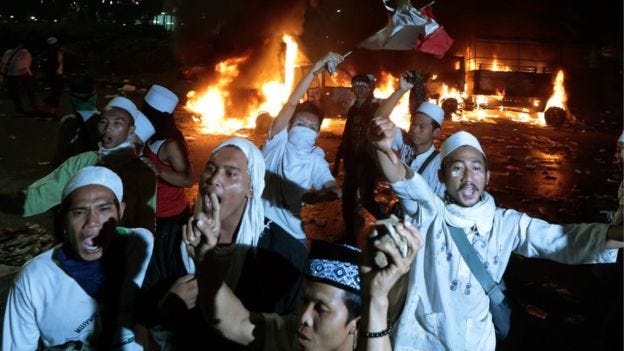Nowadays, everything in our life is online, whatever we want to find is available on the internet, whether it’s rare goods or detail specific information about some people. We live in the era where it is no longer us who are looking for information, it’s the information itself that come to us without even being asked.
For an archipelago country with 17,000 thousand islands spread across equator, internet plays important role for Indonesia, as it’s able to create equal opportunity for its citizen. A talented bathroom singer in Sumba has the same odd to be found by an agent as the one in Bandung, for instance.

Internet has changed how we live and how we interact with others. Perhaps, it should also change how we think especially when amount of fake news and fabricated information have abundantly polluted it.
As more and more heated argument and friction among our society are happened because of this abundant provoking misinformation (ie. Ahok’s case), it is essential to look for factors that make our society susceptible to being misinformed.
During New Order, Indonesians used to live in a country where there was only one television channel with only one news program. All the news broadcast was the one approved by the government. Though by the time the new order ends few television channel have appear, the news disseminated through the people was similar.
Meanwhile, in school, students were being fed with textbook material made by the authority and were discouraged to criticize or question it. Some books were censored or even banned. Comparative reading which could offer many perspectives in seeing things was never being introduced. There was only one point of view and it was what the ruler wanted the students to believe.
Those who grew up during new order are now in their adult age. The older they are, the more conservative and close minded they might be. Not all, but most. It is perhaps related to longer exposure of authoritative environment that has shaped their character.
Furthermore, most Indonesians would first be exposed to indoctrinate teaching of religion and culture from their parents prior to receive formal education at school. They were being loaded with religious and cultural teaching which emphasize more on what and how things should be done, rather than why they should be done. Even if they asked why, their parents would not answer it appropriately as they did not know either.
There was a research being done in Jakarta which found that level of knowledge in a low socioeconomic community did not relate to their attitude and behavior. The populations in the study had a good attitude and behavior toward sanitation, regardless their low score on knowledge test. This was an anomaly since in many other settings, attitude and behavior would only changed after there was an intervention being made on knowledge level. Apparently, these people only followed what their leader asked them to do without even know the reason why they should do it.
The combination of authoritative environment, mischievous education, and indoctrinate teaching in the beginning of life, apparently have created close minded adults who had no ability to question the information they got. For them, to consider something as truth or fake is depended on who deliver the information (or misinformation) not, what the context of the information and the evidence behind it. They are more likely to use intuitive thinking rather than critical and analytic thinking.
Based on The National Council for Excellence in Critical Thinking, critical thinking is intellectually disciplined process of actively and skillfully conceptualizing, applying, analyzing, synthesizing, and/or evaluating information gathered from, or generated by, observation, experience, reflection, reasoning, or communication, as a guide to belief and action. While analytic thinking is the abstract separation of a whole into its constituent parts in order to study the parts and their relations.
To have a critical and analytic thinking is not easy, there may be barriers within oneself such as incapability of seeing things from more than one perceptive and reluctance to question the norm. In academic setting, common sense is usually questioned or challenged, but in a community where religious or cultural teaching deeply rooted, it will be hard to do it.
Critical and analytic thinking are what needed the most when information come at us every second from every possible direction. Our mind should be in these mode anytime we learn about something new. We can not rely on who deliver the news to decide its truth since everyone has the same odds to speak falsely, regardless who they are and their social status. We should first consider to criticize and analyze the information, list every possible question, look for the evidence, identify the argument and finally conclude it to decide whether the information given is true or false. Thus, if ones fail to incorporate critical and analytic in their cognitive process, they will easily fall to misinformation.
No comments:
Post a Comment